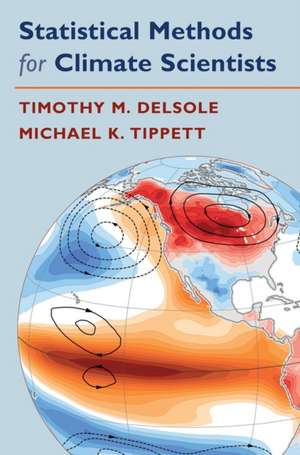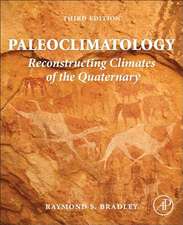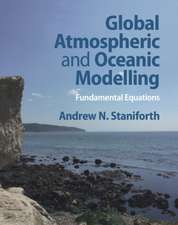Statistical Methods for Climate Scientists
Autor Timothy DelSole, Michael Tippetten Limba Engleză Hardback – 28 feb 2022
Preț: 397.12 lei
Preț vechi: 431.66 lei
-8% Nou
75.100€ • 79.05$ • 62.74£
Carte disponibilă
Livrare economică 22 martie-05 aprilie
Livrare express 11-15 martie pentru 54.92 lei
Specificații
ISBN-10: 1108472419
Pagini: 542
Dimensiuni: 173 x 250 x 28 mm
Greutate: 1.13 kg
Ediția:Nouă
Editura: Cambridge University Press
Colecția Cambridge University Press
Locul publicării:Cambridge, United Kingdom
Cuprins
Recenzii
'This book is essential for any climate scientist and is ideally suited for an introductory graduate course in climate analysis. The material covered includes a comprehensive sample of classical and modern multi-variate techniques that are widely used in the peer-reviewed literature. The step-by-step examples are clearly based on years of hands-on teaching experience by the authors and are easily implementable and, importantly, highlight interpretation and limitations - a must for any climate analysist.' Ben Kirtman, University of Miami
'An appealing book written by outstanding authors, with basic to advanced topics in every chapter, including some unusual topics for a statistics book such as data assimilation and the most predictable modes. The iteration with several years of students to produce an understandable and logical text (which is formal and analytical in nature) is unique and worthy for consideration as a textbook for graduate courses or as refresher for any geophysical scientist.' Huug van den Dool, NOAA
'Includes both the mathematics and the intuition needed for climate data analysis.' Dennis L. Hartmann, University of Washington
Descriere
A comprehensive introduction to the most commonly used statistical methods relevant in atmospheric, oceanic and climate sciences. Each method is described step-by-step using plain language, and illustrated with concrete examples, with relevant statistical and scientific concepts explained as needed. Particular attention is paid to nuances and pitfalls, with sufficient detail to enable the reader to write relevant code. Topics covered include hypothesis testing, time series analysis, linear regression, data assimilation, extreme value analysis, Principal Component Analysis, Canonical Correlation Analysis, Predictable Component Analysis, and Covariance Discriminant Analysis. The specific statistical challenges that arise in climate applications are also discussed, including model selection problems associated with Canonical Correlation Analysis, Predictable Component Analysis, and Covariance Discriminant Analysis. Requiring no previous background in statistics, this is a highly accessible textbook and reference for students and early-career researchers in the climate sciences.




